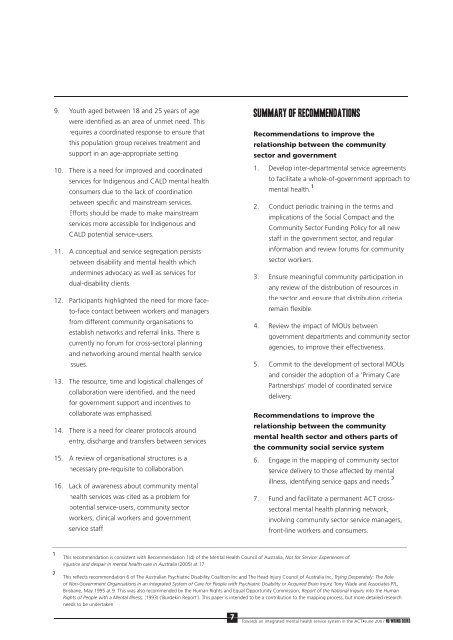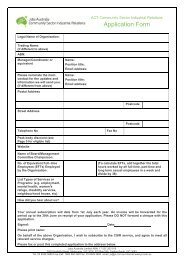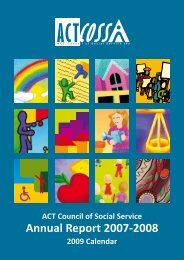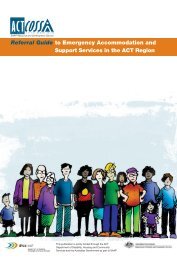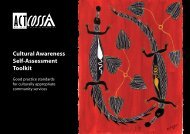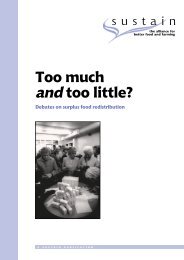actcoss text final.indd - ACT Council of Social Service
actcoss text final.indd - ACT Council of Social Service
actcoss text final.indd - ACT Council of Social Service
You also want an ePaper? Increase the reach of your titles
YUMPU automatically turns print PDFs into web optimized ePapers that Google loves.
9. Youth aged between 18 and 25 years <strong>of</strong> age<br />
were identified as an area <strong>of</strong> unmet need. This<br />
requires a coordinated response to ensure that<br />
this population group receives treatment and<br />
support in an age-appropriate setting.<br />
10. There is a need for improved and coordinated<br />
services for Indigenous and CALD mental health<br />
consumers due to the lack <strong>of</strong> coordination<br />
between specific and mainstream services.<br />
Efforts should be made to make mainstream<br />
services more accessible for Indigenous and<br />
CALD potential service-users.<br />
11. A conceptual and service segregation persists<br />
between disability and mental health which<br />
undermines advocacy as well as services for<br />
dual-disability clients.<br />
12. Participants highlighted the need for more faceto-face<br />
contact between workers and managers<br />
from different community organisations to<br />
establish networks and referral links. There is<br />
currently no forum for cross-sectoral planning<br />
and networking around mental health service<br />
issues.<br />
13. The resource, time and logistical challenges <strong>of</strong><br />
collaboration were identified, and the need<br />
for government support and incentives to<br />
collaborate was emphasised.<br />
14. There is a need for clearer protocols around<br />
entry, discharge and transfers between services.<br />
15. A review <strong>of</strong> organisational structures is a<br />
necessary pre-requisite to collaboration.<br />
16. Lack <strong>of</strong> awareness about community mental<br />
health services was cited as a problem for<br />
potential service-users, community sector<br />
workers, clinical workers and government<br />
service staff.<br />
SUMMARY OF RECOMMENDATIONS<br />
Recommendations to improve the<br />
relationship between the community<br />
sector and government<br />
1. Develop inter-departmental service agreements<br />
to facilitate a whole-<strong>of</strong>-government approach to<br />
mental health. 1<br />
2. Conduct periodic training in the terms and<br />
implications <strong>of</strong> the <strong>Social</strong> Compact and the<br />
Community Sector Funding Policy for all new<br />
staff in the government sector, and regular<br />
information and review forums for community<br />
sector workers.<br />
3. Ensure meaningful community participation in<br />
any review <strong>of</strong> the distribution <strong>of</strong> resources in<br />
the sector and ensure that distribution criteria<br />
remain flexible.<br />
4. Review the impact <strong>of</strong> MOUs between<br />
government departments and community sector<br />
agencies, to improve their effectiveness.<br />
5. Commit to the development <strong>of</strong> sectoral MOUs<br />
and consider the adoption <strong>of</strong> a ‘Primary Care<br />
Partnerships’ model <strong>of</strong> coordinated service<br />
delivery.<br />
Recommendations to improve the<br />
relationship between the community<br />
mental health sector and others parts <strong>of</strong><br />
the community social service system<br />
6. Engage in the mapping <strong>of</strong> community sector<br />
service delivery to those affected by mental<br />
illness, identifying service gaps and needs. 2<br />
7. Fund and facilitate a permanent <strong>ACT</strong> crosssectoral<br />
mental health planning network,<br />
involving community sector service managers,<br />
front-line workers and consumers.<br />
___________________________________________________________________________________________________________________________<br />
1<br />
2<br />
This recommendation is consistent with Recommendation 1(d) <strong>of</strong> the Mental Health <strong>Council</strong> <strong>of</strong> Australia, Not for <strong>Service</strong>: Experiences <strong>of</strong><br />
injustice and despair in mental health care in Australia (2005) at 17<br />
This reflects recommendation 6 <strong>of</strong> The Australian Psychiatric Disability Coalition Inc and The Head Injury <strong>Council</strong> <strong>of</strong> Australia Inc, Trying Desperately: The Role<br />
<strong>of</strong> Non-Government Organisations in an Integrated System <strong>of</strong> Care for People with Psychiatric Disability or Acquired Brain Injury, Tony Wade and Associates P/L,<br />
Brisbane, May 1995 at 9. This was also recommended by the Human Rights and Equal Opportunity Commission, Report <strong>of</strong> the National Inquiry into the Human<br />
Rights <strong>of</strong> People with a Mental Illness, (1993) (‘Burdekin Report’). This paper is intended to be a contribution to the mapping process, but more detailed research<br />
needs to be undertaken.<br />
7 Towards an integrated mental health service system in the <strong>ACT</strong>•June 2007 NO WRONG DOORS


